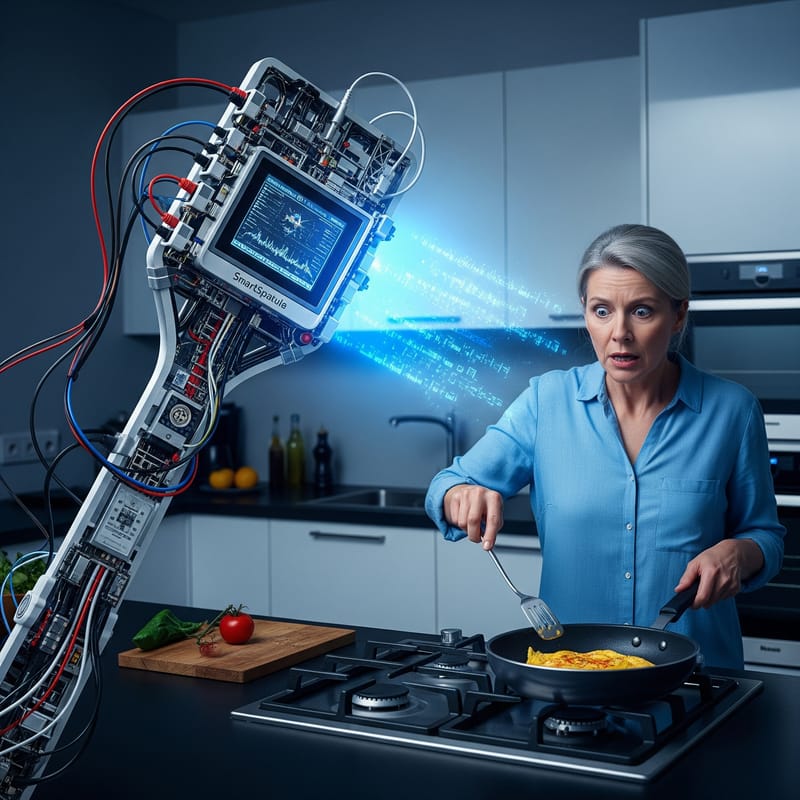The Great Spatula Debate: A Concurring Opinion on Culinary Implements
Why: The "smart spatula" is a good example of technology introduced without proper consideration for its practical value or intrusive nature. Breyer's eye-roll would come from the unnecessary complexity and privacy concerns for something as simple as a spatula, viewing it as an example of technology overreaching its "purpose."
In an era obsessed with "smart" devices, the town of Silicon Spatula Springs (a suburb famed for its tech startups and artisanal kitchens) became the unwitting ground zero for a culinary revolution nobody asked for. Under pressure from local tech incubators, the city council passed Ordinance 2.0, "The Intelligent Implement Mandate." This ordinance declared that all households and commercial kitchens within city limits must replace their traditional spatulas with the "SpatulaX 5000 SmartSpatula." This device, boasting Wi-Fi connectivity, a built-in temperature sensor, a calorie counter, and an AI-powered "flipping coach" that would audibly admonish users for improper technique, was touted as a breakthrough in health and culinary precision. The inevitable backlash led to Citizens for Sensible Kitchens v. City of Silicon Spatula Springs, a case now poised before the Supreme Court.
When Innovation Overcooks Practicality
Breyer's Eye Scream!
Justice Stephen Breyer, with his enduring commitment to pragmatism and a keen eye for the practical consequences of laws and technologies, would approach "The Great Spatula Debate" with a mixture of exasperation and perhaps a weary amusement. For Breyer, technology should serve a clear, beneficial purpose and integrate seamlessly into daily life without creating undue complexity or unforeseen problems. The "SmartSpatula" would represent the epitome of technological overreach, failing utterly on the grounds of utility and practicality.
Breyer would immediately cut through the marketing hype of "culinary precision" and "health optimization." He would ask: What is the demonstrable, real-world purpose of a smart spatula? What problem does it actually solve that a simple, inexpensive, and durable traditional spatula does not? The answer, in his pragmatic assessment, would be a resounding "none" that justifies its mandatory adoption.
He would then move to dissect the actual, observable consequences and the practical burdens imposed by this seemingly innocuous kitchen utensil:
- Unnecessary Complexity and Frustration: A spatula's purpose is simple: to flip, scrape, and stir. Adding Wi-Fi, sensors, and an AI coach to this fundamental tool introduces layers of unnecessary complexity. Users would face connectivity issues, software updates, battery charging (imagine a spatula running out of battery mid-omelet!), and the frustration of dealing with a device that demands more attention than the food itself. For Breyer, a tool that makes a simple task harder is fundamentally impractical.
- Privacy Concerns: A Wi-Fi-enabled spatula that tracks temperature, calorie counts, and perhaps even logs cooking habits (as "smart" devices are wont to do) raises significant privacy concerns. Who has access to this data? Could it be sold to advertisers or insurance companies? Could it be subpoenaed? The idea of a cooking implement potentially monitoring one's dietary choices or kitchen activities would strike Breyer as an unacceptable intrusion into the private sphere, particularly for a device with such marginal utility.
- Economic Burden and Inequality: Mandating the purchase of a technologically advanced, presumably more expensive, spatula would place an undue economic burden on households, especially those with limited incomes. Why should every citizen be forced to buy an expensive, complex device when a perfectly functional, inexpensive alternative exists? This creates an unnecessary financial hurdle for performing a basic life function, disproportionately affecting vulnerable populations.
- Safety and Hygiene Issues: Introducing electronics, batteries, and charging ports into a kitchen environment, especially one exposed to heat, grease, and water, raises safety and hygiene concerns. Is the device truly waterproof? What happens if it malfunctions due to heat? The practical risks associated with integrating complex electronics into a high-contact, high-temperature, wet environment would be a significant red flag.
- Lack of Proportionality and Government Overreach: The government mandating a specific brand or type of kitchen utensil for its citizens represents a staggering level of governmental overreach into private life. For Breyer, the government's role is not to dictate the specific tools individuals must use for their daily tasks, especially when no compelling public health or safety issue is genuinely addressed. The means (mandating a "smart spatula") are wildly disproportionate to any conceivable legitimate public purpose.
In the courtroom, Breyer would likely press the city's attorneys and the SmartSpatula manufacturer with a barrage of practical questions: "What is the actual problem this device solves that traditional spatulas cannot? What are the documented health benefits that outweigh the cost and complexity? Who owns the data collected by this spatula? What recourse does a citizen have if their SpatulaX breaks mid-stir-fry?" He would likely challenge the assertion that "innovation" for its own sake justifies such an intrusive and impractical mandate.
Ultimately, "The Great Spatula Debate" would serve as a textbook example of a law that, while perhaps well-intentioned by tech enthusiasts, utterly fails Breyer's pragmatic test. It introduces complexity where simplicity thrives, raises significant privacy and economic concerns, and lacks any discernible, practical benefit that justifies its mandatory imposition. For Breyer, the "consequences" of forcing citizens to adopt such an over-engineered and intrusive device would far outweigh its dubious "purpose." His opinion would likely be a clear, no-nonsense rejection of a mandate that exemplifies technological solutionism run amok, asserting that good policy, even in the realm of innovation, must always prioritize practicality, simplicity, and individual liberty.
Video created with Gemini Pro for the Eye Scream series, a tribute to Justice Stephen Breyer.






